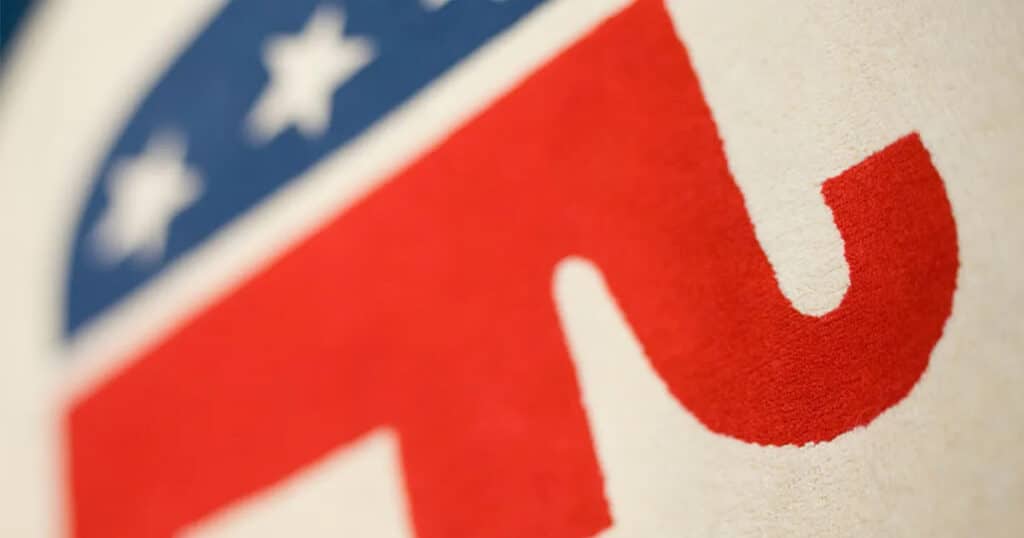
The GOP Is the Unlettered Party. And That’s a Good Thing.
Over the coming weeks, a new band of Republicans will announce themselves as candidates in the next presidential race. The frontrunners will be scrappy populists. Today’s most successful center-right politicians are not only champions of the common man but energetic opponents of the idea that our society needs reordering by credentialed authorities.
Ron DeSantis grew up in a blue-collar family, worked his way into Yale with his brains and baseball talent, then went home and built a political career on the idea that “people are able to make decisions on their own.” Florida’s navigation of the COVID crisis, says the governor, established “a blueprint for governance” that rebukes “the entrenched elites” who so often dominate modern society. “Florida is proof positive that we, the people, are not powerless in the face of these elites.”
South Carolina Sen. Tim Scott was raised in poverty, went to college on a football scholarship while his brother became a sergeant major in the U.S. Army, then entered politics to fend off the idea that ordinary people can only improve their station through the interventions of a federal patriciate.
Greg Abbott, who lost his father early in life and then was disabled and confined to a wheelchair, gained national prominence as Texas’ governor battling the notion that problems should be solved by mandates from erudite Feds.
Glenn Youngkin, Virginia’s chief executive, left a finance career and dove into politics to defend everyday parents from fouls and interference by officials claiming they know better what children need.
The most striking change in modern American politics is a flipping of the class loyalties of the two major parties. For decades, Democrats were seen as defenders of the little guy, and the GOP as home for pillars of the establishment. But country-club Republicans have been displaced by country-music Republicans, while our socio-economic gentry of lawyers, Wall Streeters, professors, Hollywood moguls, tech millionaires, media influencers, and others from the beau monde have flooded into the “D’s” column.
It wasn’t just Donald Trump who made the GOP the party of the common man. Political scientist Everett Carll Ladd noted way back in 1976 that the class lines of our political parties were turning “upside down.” John F. Kennedy had been elected by the “regular guy” – among college-educated, high-income voters, he lost 2-1. From that point forward, though, campus-trained and highly compensated elites surged to the Democrat side, while working-class men and women shifted toward Republicans.
This political inversion of elite and non-elite Americans reached its tipping point in 2012. That year, for the first time, our richest citizens voted primarily in favor of Democrats. The flow of the nation’s anointed into the Democratic camp, while the hoi polloi gravitated to the GOP, has accelerated since. In the 2022 midterms, among electors lacking a bachelor’s degree, only 39% voted for a Democratic Party congressional candidate.
It’s easy to forget that college graduates are still the fortunate few. Among Americans 25 and older, just 38% currently wield a bachelor’s or higher diploma. And Democrats are much further from the mainstream on this than Republicans: Half of the Democrats’ voters hold a bachelor’s degree, and roughly a quarter possess a graduate degree.
Rather than exploring political orientation as a function of edu-economic privilege, most contemporary journalists explain party alignment using racial and ethnic markers. This is why they were so surprised when Trump won two-thirds of working-class counties in 2020, and 26% of all non-white votes. They were flabbergasted two months ago when DeSantis attracted an overwhelming majority of blue-collar ballots, along with 58% of all Hispanic votes.
Americans of varying complexions and backgrounds are now expressing a bold populism. They complain that in schools, corporations, government agencies, media, and other institutions, entrenched elites are seeking to force-feed them a strange new agenda. Many articles of progressive faith presented by elites as enlightened, non-negotiable truth strike average Americans as patent nonsense – and are being resisted. It is almost exclusively center-right leaders who are supporting these declarations of independence.
This populist backlash has been aggressively characterized by the ruling establishment as hate, ignorance, and animus. Many residents of the high-income hipster towns sprinkled from San Francisco to Brooklyn see the typical American Joe as a scary mix of dumb and dangerous. Progressives use their many professional platforms, and the approved press and online salons that project their crotchets across the country with 10-foot-long shadows, to paint every peasant revolt as an insurrection led by fascists or white supremacists.
A few traditional economic-minded progressives look at the status of humble Americans and see legitimate beefs. Clinton Labor Secretary Robert Reich warned after Donald Trump’s election that “what has happened in America should not be seen as a victory of hatefulness over decency.” It “is more accurately seen as a repudiation of … major media … corporations … lobbyists … Wall Street … and their lackeys in Washington,” an outcry from a large mass of workaday citizens “who feel powerless and disenfranchised, and who have been left out of our politics and left behind in our economy.”
Data demonstrate starkly that the vast proportion of our nation’s income gains in recent decades have been captured by America’s Brahmin class, with middle- and working-class families clinging to small and shrinking slices. Blue-collar communities are being ravaged by poverty and social breakdown. Meanwhile, telecommuting towns inhabited by our professional, finance, and tech aristocracies glisten.
The social and political concerns of average workers have been shoved aside even more flagrantly than their economic interests. Elites don’t just ignore the perspectives of flyover America on topics like family, sex, race, religion, childrearing, patriotism, and culture – they actively delegitimize them.
Journalism was once a bastion of local, man-on-the-street perspectives. It has been transformed into a highly paid insider’s profession packed with Ivy Leaguers and centered in D.C. and Manhattan. Reporters, writers, and related interpreters of culture now sit right at the heart of our controlling class, and most of these pundits view “Rule by the Smartest” as a good thing. Their media portraits paint it as both healthy and normal.
Historically, however, our country has been the opposite of a land run by edu-economic nobles. From our beginning, America’s gospel creed has been that every person’s judgment is as worthy as the next. No peons. No lords.
George Washington noted that the privates in his army overflowed with a proud, self-governing spirit and would not be dictated to, but had to be led. This obstreperousness was leveraged by smart commanders to produce powerful results – as when Col. Isaac Shelby defeated a larger force of regimented soldiers at the Battle of King’s Mountain by telling his men, “When we encounter the enemy, don’t wait for the word of command. Let each of you be your own officer.”
The most perspicacious chronicler of America’s emergence, Alexis de Tocqueville, was simultaneously “struck by the innumerable multitude of little undertakings” accomplished by humble people, and the utter lack of great projects directed by any commissariat. He recorded his “daily astonishment at the immense works carried through … by a nation which, one may say, has no rich men.”
The European pattern of royal and rustic, cupbearer and kulak, was fiercely rejected on this side of the Atlantic. There were no quiet sheep here willing to be herded by omniscient shepherds. Jefferson captured the American ethos in graphic imagery: “The mass of mankind has not been born with saddles on their backs, nor a favored few booted and spurred … to ride them.”
Resistance to being overseen by even a highly accomplished upper strata is in many ways the distinguishing characteristic of our national system, the deepest quirk that separates us from other states and people. New Englanders refused early on to let rulers from Old England impose codes upon their independent communities. By 1776 Americans were registering primal screams against “a long train of abuses and usurpations” that decreed, taxed, quartered, and mandated without popular consent. Even the Progressive movement of the 20th century began as a cry against the impositions of haughty monopolies – railroads, political bosses, unresponsive agencies, and corporations. Historically, America has been hostile to any centralized capture of decision-making. Populism is in our blood.
So that was the olden days. What about now? Is it smart for a political party to pursue a populist approach, given the present climate of demagoguery and blood-sport politics? Do Republicans really want to cast their loyalties with the great unwashed?
There is actually a strong argument to be made that our national success, stability, and virtue have been built much more on popular energy, decency, and wisdom than on the astuteness of American elites.
It’s true that a republic centered on the common man will often exhibit a scratchy and brawling political dynamic. Ours always has. Jefferson characterized rule by everyday people as a “boisterous sea” – yet much to be preferred to “the calm of despotism.”
We saw that messy dynamic in action on the House floor last week. But while it can at times be indecorous, American populism has never produced anything close to despotism. Quite the opposite.
A few decades after Tocqueville commented on the constructive genius of normal citizens in America, perceptive foreign observers like Englishman George Ruxton and Pole Henryk Sienkiewicz likewise wandered our land and discovered deep reserves of insight and fair play among our untutored residents. The unassuming farmers, trappers, soldiers, and traders they interrogated impressed them with their judicious acumen and moral goodness. They were less taken with the residents they met in upper-class salons.
Our long national experience with successful populism seems to be invisible to the journalist/techie/lawyer/professor mandarins who currently exhibit such suspicion toward mass opinion. Superior thinkers and would-be culture shapers complain of our lumbering government and the yokels who prevent it from being recast by intellectuals, data-barons, science doyens, and ethical innovators.
That attitude inadvertently reveals great ignorance of U.S. history. Our national code was written by founders whose careful study of human autocracy over the ages left them keenly chastened. America’s architects created a prudent, intensely hedged, fail-safe republic that aimed specifically to empower the unexceptional citizenry – not to ease life for the smart and aggressive experts who always swarm halls of power hoping to apply brisk instruments of government to reshape society in their own image.
James Madison explained it this way: “The difference between our government and others was happily this: that here the government had an anxious and difficult task … while the people stood at ease – not pressed upon, not driven.” In contrast, he noted, wherever ambitious and willful cliques are able to grab power, “government has an easy time, and the people have to bear and do everything.”
Popular governments will sometimes embarrass, but they rarely morph into the most egregious errors or tyrannies. After listing numerous examples from World War II where intellectuals were “more wrong about the progress of the war than the common people,” George Orwell concluded that expert analysis is regularly inferior to popular wisdom. There are many absurd ideas that “one has to belong to the intelligentsia to believe,” he wrote, because “no ordinary man could be such a fool.”
Males can become females. … Trillions may be spent by government without causing inflation. … Releasing criminals from lawful sentences won’t affect predation. … Both of his parents are Stanford professors, so that nice cryptocurrency pioneer must be right.
The gravest existential dangers to America at present are being fomented by our nobility, not our yahoos: a discarding of rowdy free speech in favor of ecclesia-approved dogma. Rewriting history. Toxic labeling by gatekeepers to signal that an argument or individual should be shunned. Using academic guilds to suppress heterodox research. Blandly invoking “science,” racial appropriation, or “unsafe feelings” to shut down debate. Reducing all opposing arguments to “hate.” Forcing into official discourse and law exotic claims promulgated among elites that have never been embraced by the public.
Yes, an extreme rabble can sometimes imperil a society. But the best way to preclude festering among commoners who feel wounded is to listen to them and then treat their afflictions. Ignoring, slighting, or degrading citizens of modest condition is both wrong and impolitic. And arguing that the American Cossacks who periodically gallop their pickup trucks through D.C. and N.Y. are an insurrectionary horde on the brink of seizing the nation’s levers of power is: (a) laughable as social diagnosis; and (b) insulting as political strategy.
Far more plausible than a rube ruination of our society is the opposite nightmare: an educated, wealthy, powerful aristocracy – grown self-important, overbearing, and intolerant – losing all sympathy for middle America. In corridors of power right now, concern for working-class “Deplorables” is at a new low. We are allowed to call them rednecks, reactionaries, and racists, because such creatures deserve only to be bullied and lorded over. That scorn is our era’s most unexamined, unchecked, un-American civic breach.
It’s not demagogic to champion what H.L. Mencken’s heirs deprecate as the “booboisie.” Nor it is anti-intellectual to be skeptical of expertise, and chary of those claiming political power in its name. From Francis Galton to Friedrich Hayek, one of history’s most time-proven realities is the superiority of plain empirical experience over brilliant theorizing.
Ordinary citizens possess forms of knowledge, intuition, and moral sense that make them, as a body, better arbiters of many fundamental issues than any clutch of educated specialists. That’s been called the wisdom of crowds, group intelligence, symbiotic assessment, decentralized problem-solving, dispersed judgment, crowdsourcing – and it is undeniably powerful.
“Wisdom is often nearer when we stoop than when we soar,” concluded William Wordsworth. That ancient insight is the secret of American success. Political leaders who defend it today will earn both results and repute.
This article was originally published by RealClearPolitics and made available via RealClearWire.



